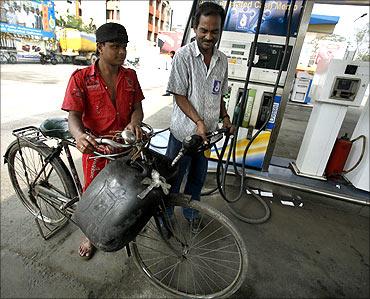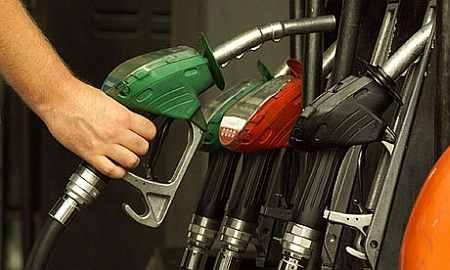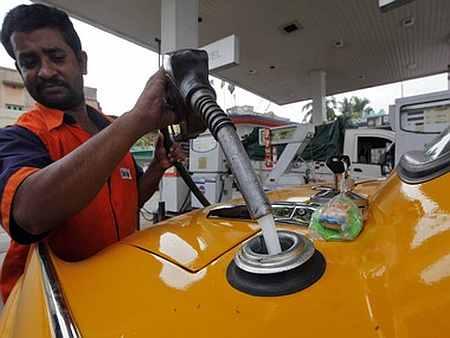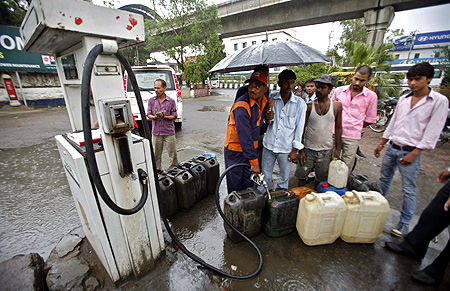 | « Back to article | Print this article |
India may announce steps to cut fuel use this month
India could announce steps to curb fuel consumption on September 16, Foreign Minister Salman Khurshid said on Friday, in a bid to cut the biggest item in the country's import bill and help support a rupee skittering just above record lows.
The world's fourth-biggest energy user is widely expected to announce a steep hike in diesel prices soon, as it looks to cut oil costs by nearly $20 billion. Rising global prices of crude and the rupee's slide have left India facing an oil bill potentially 50 per cent higher than on May 1.
"No matter what happens, we will have to cut down on fuel consumption," Khurshid told business channel CNBC TV18.
Click NEXT to read further. . .
India may announce steps to cut fuel use this month
"You can't keep subsiding costs of fuel and not restrict the use of the fuel."
Oil Minister M Veerappa Moily could unveil fuel-saving measures when he returns from a trip next week to Japan and South Korea. Khurshid gave no details of the possible steps.
Moily has already suggested ways to cut fuel import costs in letters to the prime minister and finance ministry a week ago, ranging from a street theatre campaign encouraging economies to stepping up imports from Iran that India pays for in rupees.
But India, where energy consumption per person is among the lowest in the world, has little elasticity in its fuel use as it tries to power exports and agriculture to help boost its economy and stave off a currency crisis.
Click NEXT to read further. . .
India may announce steps to cut fuel use this month
More than 40 per cent of fuel demand, or about 1.4 million barrels per day (bpd), is for diesel, and the bulk of that is used by trucks, farmers and industry, which needs back-up generators to cope with the country's frequent power blackouts.
The government subsidises diesel prices, which are now about 10 rupees a litre below estimated market rates.
Petrol prices are not subsidised.
An increase of 5 rupees per litre on diesel could save about $4.3 billion in oil costs, Reuters calculations show.
Click NEXT to read further. . .
India may announce steps to cut fuel use this month
Total subsidies on fuel amount to about $25 billion a year and India's crude oil import bill was $144 billion last fiscal year.
Khurshid said Indians were increasingly realising the "inevitability" of moving away from government-controlled prices.
"That's beginning to happen, but has political implications," he said.
Fuel price hikes generally provoke stiff resistance from opposition parties and any hike now is expected to draw a bigger protest, with a general election due next year. The election must be held by May 2014.
Click NEXT to read further. . .
India may announce steps to cut fuel use this month
Diesel demand has edged down 1.1 per cent between April and July, Oil Secretary Vivek Rae told Reuters, largely due to reduced consumption by trucks as heavy monsoon rains in June and July hit road transport.
The rains also reduced the need for farmers to run irrigation pumps.
Overall products use rose 1.1 per cent between April and July, Rae said, with petrol consumption up 11.4 per cent.
Two-wheelers, which run only on petrol, are the backbone of private transport in India, where middle-class incomes are still too small for most families to afford cars.

© Copyright 2025 Reuters Limited. All rights reserved. Republication or redistribution of Reuters content, including by framing or similar means, is expressly prohibited without the prior written consent of Reuters. Reuters shall not be liable for any errors or delays in the content, or for any actions taken in reliance thereon.




